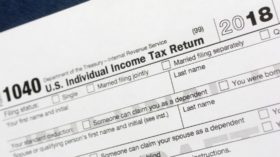 Can California really require candidates to disclose their tax returns to qualify for the presidential primary ballot? As with many constitutional questions, the answer is uncertain. Courts could come down either way on this one.
Can California really require candidates to disclose their tax returns to qualify for the presidential primary ballot? As with many constitutional questions, the answer is uncertain. Courts could come down either way on this one.
Critics of the disclosure requirement will invoke the rights of individuals to run for office and the rights of voters to “choose whom they please to govern them.” These principles have led the Supreme Court to hold that states may not add eligibility criteria for congressional candidates that exceed those in the Constitution. Hence, a term limits law that denies eligibility to candidates who have previously served for a certain length of time is unconstitutional. Similarly, it is argued, states cannot make disclosure of tax returns a requirement for running for office.
The Court also has blocked states from making it too difficult for candidates to qualify for the ballot. Accordingly, the court has rejected early filing requirements for third-party and independent candidates or requirements that candidates seeking some offices meet more stringent petition requirements than candidates for other offices in the state.
Supporters of the disclosure requirement observe that the Supreme Court has allowed restrictions on ballot access that are not too demanding. Thus, it is permissible to require third-party or independent candidates to submit petitions signed by 5 percent of voters. Disclosing one’s tax returns is easier to do than obtaining signatures from 5 percent of voters.
And California has important interests in ensuring that voters are properly informed about candidates. Candidates are required to disclose campaign contributions and expenditures. So should they disclose their tax returns.
In addition, states have special authority with regard to presidential elections that they do not have for congressional elections. As Richard Hasen has written, states have broad power to determine how their Electoral College electors are chosen.
If this issue reaches the U.S. Supreme Court, a majority could uphold the law for the reasons mentioned by supporters of the law. But it would not be difficult for a majority to reject the California law, and for a few reasons.
First, the Court has upheld previous ballot access laws on the ground that states have a legitimate interest in limiting the number of candidates to a reasonable number. That interest is not at stake here.
Second, the Court may have the same concern that former California Gov. Jerry Brown expressed when he vetoed a similar law two years ago. Allowing this disclosure requirement could open the door to a broad range of disclosure requirements that delve into highly personal information.
Third, states usually enforce campaign disclosure requirements with prosecutions after the fact rather than preventing the candidate from running. To be sure, a conviction for campaign finance violations can disqualify the violator from running for elective office in the future, but that is only after a judicial proceeding.
